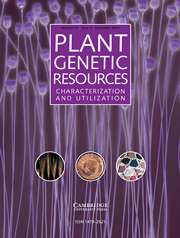Crossref Citations
This article has been cited by the following publications. This list is generated based on data provided by
Crossref.
Bashir, Elfadil M.A.
Ali, Abdelbagi M.
Ali, Adam M.
Ismail, Mohamed I.
Parzies, Heiko K.
and
Haussmann, Bettina I.G.
2014.
Patterns of pearl millet genotype-by-environment interaction for yield performance and grain iron (Fe) and zinc (Zn) concentrations in Sudan.
Field Crops Research,
Vol. 166,
Issue. ,
p.
82.
Pucher, Anna
Høgh‐Jensen, Henning
Gondah, Jadah
Hash, C. Tom
and
Haussmann, Bettina I. G.
2014.
Micronutrient Density and Stability in West African Pearl Millet—Potential for Biofortification.
Crop Science,
Vol. 54,
Issue. 4,
p.
1709.
Gemenet, D. C.
Leiser, W. L.
Zangre, R. G.
Angarawai, I. I.
Sanogo, M. D.
Sy, O.
Mahendar, T.
Hash, C. T.
and
Haussmann, B. I. G.
2015.
Association analysis of low-phosphorus tolerance in West African pearl millet using DArT markers.
Molecular Breeding,
Vol. 35,
Issue. 8,
Mallikarjuna, Mallana Gowdra
Thirunavukkarasu, Nepolean
Hossain, Firoz
Bhat, Jayant S.
Jha, Shailendra K.
Rathore, Abhishek
Agrawal, Pawan Kumar
Pattanayak, Arunava
Reddy, Sokka S.
Gularia, Satish Kumar
Singh, Anju Mahendru
Manjaiah, Kanchikeri Math
Gupta, Hari Shanker
and
Mondal, Tapan Kumar
2015.
Stability Performance of Inductively Coupled Plasma Mass Spectrometry-Phenotyped Kernel Minerals Concentration and Grain Yield in Maize in Different Agro-Climatic Zones.
PLOS ONE,
Vol. 10,
Issue. 9,
p.
e0139067.
Bashir, Elfadil M. A.
Ali, Abdelbagi M.
Ali, Adam M.
Mohamed, El Tahir I.
Melchinger, Albrecht E.
Parzies, Heiko K.
and
Haussmann, Bettina I. G.
2015.
Genetic diversity of Sudanese pearl millet (Pennisetum glaucum (L.) R. Br.) landraces as revealed by SSR markers, and relationship between genetic and agro-morphological diversity.
Genetic Resources and Crop Evolution,
Vol. 62,
Issue. 4,
p.
579.
Minnis-Ndimba, R.
Kruger, J.
Taylor, J.R.N.
Mtshali, C.
and
Pineda-Vargas, C.A.
2015.
Micro-PIXE mapping of mineral distribution in mature grain of two pearl millet cultivars.
Nuclear Instruments and Methods in Physics Research Section B: Beam Interactions with Materials and Atoms,
Vol. 363,
Issue. ,
p.
177.
Rai, Kedar Nath
Govindaraj, Mahalingam
Pfeiffer, Wolfgang Helmut
and
Rao, Aluri Sambasiva
2015.
Seed Set and Xenia Effects on Grain Iron and Zinc Density in Pearl Millet.
Crop Science,
Vol. 55,
Issue. 2,
p.
821.
Kumari, Jyoti
Bag, Manas K.
Pandey, S.
Jha, S. K.
Chauhan, S. S.
Jha, Girish K.
Gautam, N. K.
and
Dutta, M.
2016.
Assessment of phenotypic diversity in pearl millet [Pennisetum glaucum (L.) R. Br.] germplasm of Indian origin and identification of trait-specific germplasm.
Crop and Pasture Science,
Vol. 67,
Issue. 12,
p.
1223.
SANTOS, R. D. DOS
NEVES, A. L. A.
PEREIRA, L. G. R.
SOLLENBERGER, L. E.
RODRIGUES, J. A. S.
TABOSA, J. N.
VERNEQUE, R. S.
OLIVEIRA, G. F.
JAYME, D. G.
and
GONÇALVES, L. C.
2016.
Agronomic traits, ensilability and nutritive value of five pearl millet cultivars grown in a Brazilian semi-arid region.
The Journal of Agricultural Science,
Vol. 154,
Issue. 1,
p.
165.
Gangashetty, Prakash I.
Motagi, Babu N.
Pavan, Ramachandra
and
Roodagi, Mallikarjun B.
2016.
Advances in Plant Breeding Strategies: Agronomic, Abiotic and Biotic Stress Traits.
p.
35.
Kifouli, ADEOTI
Gustave, DJEDATIN
Ebenezer, EWEDJE
Thierry, BEULE
Sylvain, SANTONI
Alain, RIVAL
and
Estelle, JALIGOT
2017.
Assessment of genetic diversity among cultivated Pearl millet (Pennisetum glaucum, Poaceae) accessions from Benin, West Africa.
African Journal of Biotechnology,
Vol. 16,
Issue. 15,
p.
782.
Andersson, Meike
2017.
Biofortified varieties released under HarvestPlus (as of December 2016).
African Journal of Food, Agriculture, Nutrition and Development,
Vol. 17,
Issue. 02,
p.
11936.
Santos, Rafael
Neves, Andre Luis
Pereira, Luiz Gustavo
Verneque, Rui
Costa, Cleber Thiago
Tabosa, Jose
Scherer, Carolina
and
Gonçalves, Lucio
2017.
Divergence in agronomic traits and performance of pearl millet cultivars in Brazilian semiarid region.
Grassland Science,
Vol. 63,
Issue. 2,
p.
118.
Andersson, Meike
2017.
Progress update: Crop development of biofortified staple food crops under HarvestPlus.
African Journal of Food, Agriculture, Nutrition and Development,
Vol. 17,
Issue. 02,
p.
11905.
Marmouzi, Ilias
Ali, Kaddafi
Harhar, Hicham
Gharby, Said
Sayah, Karima
El Madani, Nadia
Cherrah, Yahia
and
Faouzi, My El Abbes
2018.
Functional composition, antibacterial and antioxidative properties of oil and phenolics from Moroccan Pennisetum glaucum seeds.
Journal of the Saudi Society of Agricultural Sciences,
Vol. 17,
Issue. 3,
p.
229.
Sattler, Felix T.
Pucher, Anna
Kassari Ango, Issoufou
Sy, Ousmane
Ahmadou, Issaka
Hash, C. Tom
and
Haussmann, Bettina I. G.
2019.
Identification of Combining Ability Patterns for Pearl Millet Hybrid Breeding in West Africa.
Crop Science,
Vol. 59,
Issue. 4,
p.
1590.
Serba, Desalegn D.
Muleta, Kebede T.
St. Amand, Paul
Bernardo, Amy
Bai, Guihua
Perumal, Ramasamy
and
Bashir, Elfadil
2019.
Genetic Diversity, Population Structure, and Linkage Disequilibrium of Pearl Millet.
The Plant Genome,
Vol. 12,
Issue. 3,
Detterbeck, Amelie
Nagel, Manuela
Rensch, Stefan
Weber, Michael
Börner, Andreas
Persson, Daniel P.
Schjoerring, Jan Kofod
Christov, Vesselin
and
Clemens, Stephan
2019.
The search for candidate genes associated with natural variation of grain Zn accumulation in barley.
Biochemical Journal,
Vol. 476,
Issue. 13,
p.
1889.
Vinoth, Alphonse
and
Ravindhran, Ramalingam
2019.
Nutritional Quality Improvement in Plants.
p.
413.
Are, Ashok Kumar
Srivastava, Rakesh K.
Mahalingam, Govindaraj
Gorthy, Sunita
Gaddameedi, Anil
Kunapareddy, Anil
Kotla, Anuradha
and
Jaganathan, Jayakumar
2019.
Sorghum and Millets.
p.
51.


